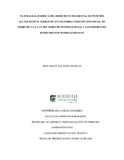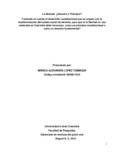Supremacía constitucional: la vulneración de los derechos y deberes constitucionales en el marco del poder, función y actividad de policía en Colombia
Fecha
2017Autor
Blanco Salazar, Jeimy Daniela
Cortés Otálora, Martha Catalina
Título obtenido
Abogado(a)
Director de tesis
Niño Contreras, Giovanny FranciscoPublicador
Universidad La Gran Colombia
Facultad
Facultad de Derecho
Programa
Derecho
Citación
Compartir
Palabras clave
Supremacía constitucionalDerechos constitucionales
Deberes constitucionales
Poder policial
Función policía
Reserva de ley estatutaria
Debido proceso
Seguridad jurídica
Derecho a la igualdad
Derecho al trabajo
Responsabilidad del estado
Derecho a la intimidad
Ley 1801 de 2016
Derecho constitucional - Colombia
Poder de la policía
Responsabilidad del estado - Colombia
Igualdad ante la ley
Consejos consultivos del poder ejecutivo - Jurisprudencia - Colombia
Resumen
En la actualidad, el Estado Social de Derecho garantiza a la población colombiana ser una sociedad democrática, participativa y pluralista, dentro de la cual se define la naturaleza del régimen político, económico y social, en un marco de valores y principios imperantes, sustentados en el principio de la dignidad humana, cuadro supremo y último que sirve para determinar la pertenencia de las normas al ordenamiento jurídico y su validez, este arraigo de superioridad es garantizado por el principio de supremacía constitucional, que en el fin estatal su función principal es velar por la protección e integridad de la Constitución, evitando así que cualquier norma de rango inferior, sea contraria a ella. A pesar de lo anterior, se encuentran disposiciones legales que van en contravía de ese marco supremo reconocido en la Carta Política de 1991, una de ellas es la Ley 1801 de 2016, Código Nacional de Policía y Convivencia, la cual se estudia en esta investigación con el fin de identificar los aspectos en los cuales es inconstitucional por estar en contraposición de deberes y derechos Constitucionales, basado en los pronunciamientos de la Corte Constitucional como máxima Corporación encargada de la salvaguarda de la Constitución, llegando a un análisis exhaustivo y planteando algunas críticas y salidas a determinadas decisiones con los cuales no estamos de acuerdo teniendo en cuenta los precedentes constitucionales respecto a cada aspecto identificado como inconstitucional tales como, reserva de ley estatutaria, derecho al trabajo, debido proceso, derecho a la igualdad, seguridad jurídica entre otros.
Abstract
At present, the social state of law ensures to the Colombian population to be a democratic, participatory and pluralistic society, within which the nature of the political, economic and social regime is defined, within a framework of prevailing values and principles, sustained in the principle of human dignity, supreme and final table that serves to determine the belonging of the norms to the legal order and its validity, this rootedness of superiority is guaranteed by the principle of constitutional supremacy, that in the state purpose its main function is to ensure The protection and integrity of the constitution, thus avoiding any rule of lower rank is contrary to it. In spite of the above, there are legal provisions that go against this supreme framework recognized in the political charter of 1991, one of them is the law 1801 of 2016, national code of police and coexistence, which is studied in this investigation In order to identify the aspects in which it is unconstitutional because it is in contraposition of duties and constitutional rights, based on the pronouncements of the constitutional court as the maximum corporation in charge of safeguarding the constitution, arriving at a comprehensive analysis and raising some criticism And exits to certain decisions with which we do not agree taking into account the constitutional precedents regarding each aspect identified as unconstitutional such as, reservation of statutory law, right to work, due process, right to equality, legal security among others.
Colecciones
- Derecho [695]
Documentos relacionados
Mostrando Documentos relacionados por Título, autor o materia.
-
El derecho internacional de los derechos humanos frente al derecho al debido proceso.
Nieto López, Ingrid Janeth (Universidad La Gran Colombia; Facultad de Derecho; Derecho, 2013)Tesis (Abogado) -- Universidad La Gran Colombia. -
Naturaleza jurídica del derecho fundamental de petición alcances de su ejercicio en Colombia como estado social de derecho a la luz del derecho internacional y los diferentes instrumentos internacionales
Palacios Murillo, Jhon Arley (Universidad La Gran Colombia; Facultad de Postgrados; Especialización en Derecho Administrativo; Bogotá, 2020-03-02)La siguiente investigación se centra en el estudio de la naturaleza jurídica del ejercicio del derecho fundamental de petición, desde una perspectiva del estado social de derecho, con respecto al derecho internacional, ... -
La libertad ¿Derecho o Principio? : Teniendo en cuenta el desarrollo constitucional que se origino con la implementación del estado social de derecho, para que el la libertad no sea vulnerada en Colombia debe invocarse como un principio constitucional o como un derecho fundamental?
López Tumbaqui, Mónica Alexandra; Paternina, Freddy (Universidad La Gran Colombia; Facultad de Derecho; Derecho; Bogotá, 2014)Durante el desarrollo de este trabajo, en primer lugar se pretende realizar un análisis sobre la importancia y evolución que ha tenido la libertad desde la implementación del modelo de estado social de derecho en Colombia. ...



